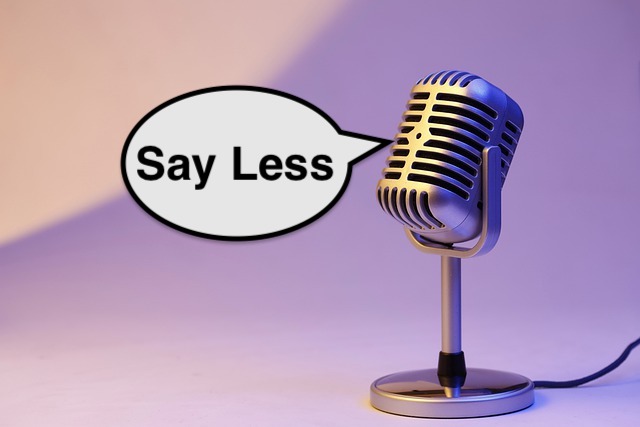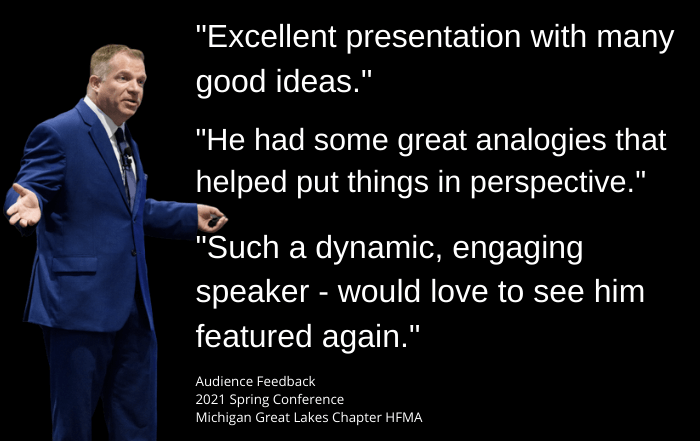 Your words matter and it may be smart to communicate more effectively with fewer of them. When you’re trying to lead a team or inspire a sale, you want to make sure you are clearly delivering information. It can be easy to come up short, by thinking more words are what’s needed.
Your words matter and it may be smart to communicate more effectively with fewer of them. When you’re trying to lead a team or inspire a sale, you want to make sure you are clearly delivering information. It can be easy to come up short, by thinking more words are what’s needed.
For instance, recently I conducted a LinkedIn poll about what people dislike about panels at events. Many conferences look to panels to engage attendees. Long panelist introductions was the top complaint.
My guess is that people are more concerned with the information that will come from the panelists, rather than hearing a lengthy bio of each person. As a moderator, I’ve found one or two sentences is all you need for those introductions. If people want to find out more about a panelist, they can locate that information on the conference app.
When you speak, you don’t want your remarks to be well-intentioned but poorly delivered. As a lifelong communicator, I want to give you some best practices for how to say more, with fewer words.
Why Should We Care?
When I worked in TV news, you would hear the phrase, “Why should we care?” repeated in the newsroom. The question served as a litmus test for a potential story.
Some story pitches are interesting but not newsworthy. For instance, a TV station would likely not do a story about children learning how to tie their shoes. But that story might air if an untied shoe recently caused a child to be hurt in an unusual accident.
The purpose of the question wasn’t to shoot down ideas but rather make sure the story would appeal to viewers, who are holding remote controls.
In your professional world, are you appealing to your audience with your words? Whether you’re presenting at a meeting or talking one-on-one with a potential customer, make sure important information, that “Why should we care?” is shared early. Otherwise, your audience may become bored, confused, and tune you out.
A Tease Is Supposed to Tease
When anchoring the news, you usually record some teases for the upcoming newscasts. You want to highlight some top stories or must-see video.
You don’t have a lot of time to do this. The longest teases were roughly 24 seconds and you were expected to preview three things. They could include a top story, upcoming weather, and maybe some kind of human interest story.
The short amount of time meant you could only say three to four sentences. You really had to pick your words, so you would give people a nugget of information but leave them wanting more.
In business communication, when you’re trying to pitch an idea or make a sale, you need to think like a news anchor recording a tease. Quickly get to the point and share some information that produces curiosity in others.
Don’t think that drowning people in words will make them want to know more.
Here’s an example of a good tease at the start of serious business presentation: “If we can’t raise profits by 7% in the next quarter, then there will likely be layoffs. Here’s our plan to achieve our revenue goal.”
In this scenario, the audience understands what is at stake and that they’re going to hear about important next steps.
Communicate More Effectively With Rehearsal
While your communication doesn’t have to be perfect, you may want to rehearse it some. When I create a keynote presentation, I start with an outline and then talk it out to discover the right words to support it. It’s not written and then memorized.
During this process, as I work on a segment, I often find I’m taking too long to get to the point or have too many tangents in a story. I then have to cut a lot of material.
Sometimes the cutting room floor is full of good moments or interesting facts. But these items need to be removed if they don’t support the main point of the segment.
For any audience, they are likely new to your remarks and can’t rewind what you say for clarity. Therefore, you need to make sure your story follows an understandable path.
Spend some time rehearsing your remarks to make sure they are clear. And don’t be afraid to cut anything that’s not necessary. Remember, you’re not being paid by the word.
Smithsonian Bound?
Will your words ultimately end up in The Smithsonian or some other museum? For most of us, the answer is, “No.”
Take your remarks seriously but don’t prepare them as if they’ll be studied for generations. When you communicate more effectively, you are simple and direct. You’ll rarely get bonus points for being long-winded.
Final Tip
If you’re still challenged by the need to communicate more effectively, then imagine you’ve been given ten minutes to speak but at the last minute you’re told you only have five.
Could you boil down your remarks to the most important points? Or would it seem like you’re leaving things out?
This scenario happens and mentally preparing for it may reveal moments that you don’t really need. No one will mind if your original ten minute talk is delivered in eight.






